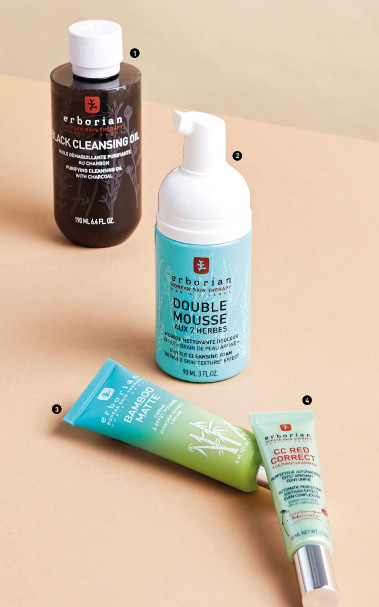These hybrid brands combine Korean ingredients and technology with the straightforward userfriendliness of Western skincare.



4 Rub-a-dub Refining Peeling Gel, $35.
Renowned Korean Expertise x Effortless Western Rituals
With its clean, modern packaging, unfussy products and promises of fresh, rested, glowing weekend like skin every day, this South Korean brand is an Instagram dream and catnip for millennials.
But despite its playful image, Saturday Skin is backed by the R&D might of its Seoul-based parent company, Chaum. An upscale medical and wellness centre, research institute and anti-ageing clinic rolled into one, Chaum has been around for more than 60 years and boasts a clientele that reportedly includes celebrities and royalty from around the world.
Saturday Skin arose from a desire to make Korean skincare approachable for consumers who might be put off by lengthy rituals and bewildering product variety. Its executive vice-president, Sidney Baek, who has worked in the beauty industry for more than two decades, was constantly asked about the secret to the Korean woman’s flawless skin. It started her thinking about creating an appealing and simplified Korean skincare line, combining Chaum’s accrued knowledge with the simple, less-is more routines of the West.
The collection is relatively small and targeted. It has 12 products (nine are currently available in Singapore) skewed towards preventive care for younger skin, covering basic needs such as cleansing, exfoliation, hydration and brightening. The formulas are nourishing and clean, with no harsh sulphates, parabens, artificial colours or fragrances. It’s also cruelty-free and vegan.
The brand is keen to highlight its scientific chops, specifically with the exclusive seven-peptide mix it calls Cha-7 ES Complex. Derived from natural ingredients, the cutting-edge complex is said to increase collagen and elasticity in skin, thereby boosting suppleness, hydration and tone, as well as improving texture through the skin’s process of renewal.

4 CC Red Correct, $62.
Streamlined Korean Routine x French Indulgence
In 2004, France-based Katalin Berenyi, then a L’Oreal executive, first encountered Korean beauty. She fell in love with the multiplicity and inventive textures of Korean skincare, including the value placed on good skin, the incredibly complex 12-step rituals, and the heavy focus on herbal ingredients and plant actives.
It spurred her to team up with a Korean scientist, Hojung Lee, to forge a brand that would turn advanced Korean beauty technology and traditional plant ingredients into multitasking products with the feel-good textures and sophisticated scents of French skincare. Think stuff like a spray-on mask, solid cleansing oil and lightweight ginseng-based BB cream that creates the look of baby skin.
Erborian condenses the Korean skincare ritual into just three steps: Detox with thorough cleansing, boost with herbal treatment, and finish with products that improve the skin’s texture and feel.

4 Micellar Cleansing Water, $20-$28.
Traditional Korean Herbs x French Phytocosmetics
Launched in 2017, this brand’s products all use a patented antioxidant it calls Lumiphenols, derived from a European medicinal plant known as the common houseleek. The antioxidant is said to detoxify and repair skin, and boost its radiance.
Says Lynn Tan, managing director of Ales Group Singapore, whose parent company in France also owns haircare brand Phyto and skincare brand Lierac: “Jowae was created to provide daily protection and restore the skin’s natural harmony.”
Working with professor Ki Hyun Kim, a vegetal chemistry researcher based in Seoul, the brand combines Lumiphenols with Asian pharmacopoeia such as white tea, lotus, red ginseng and centella. The result is a skincare line that not only fuses Asian and European ingredients, but also offers a midpoint between Korean and Western rituals.
“Jowae’s four-step routine of cleanse-prepare activate-correct is inspired by elaborate Korean rituals but designed for Westerners and those who are not used to applying many layers on their skin,” says Tan.
The products were also developed with textures to suit Asian layering, so they can be well absorbed by the skin. “Take the Hydrating Water Mist. It was inspired by Korean skin-preparing lotions, but uses the technique and form of French facial mists,” she explains. Products have an average of 93 per cent natural ingredients and contain no parabens, phenoxyethanol, mineral oil, silicone, animal ingredients or synthetic colourant.

4 100% Camellia Nourishing & Anti-wrinkle 2-step Oil Sheet Mask, $16.
Trending Korean Ingredients x Swiss Efficiency
Founded in 2015 by Dutch duo Nicole Arnoldussen and Paul Hendriks – the former an industry veteran with more than 20 years of beauty retail experience – this Swiss-owned outfit’s claim to fame is in its sheet masks.
“In our travels, Paul and I spent years studying beauty trends, and the South Korean beauty industry is light years ahead of the rest of the world,” says Arnoldussen.
In particular, they were struck by Koreans’ glowing complexions and the prevalence of sheet masks in their beauty routines. “We thought, ‘Hey, we need this. In fact, the rest of the world needs this.’ We launched Starskin to bring K-beauty’s most coveted product to the Western skincare market,” she explains.
The sheet masks feature high-nutrition ingredients popular in Korean skincare, such as marine algae, green tea and bamboo. The brand also draws on what’s in vogue, like fermented natural ingredients and “waterless” skincare based on botanical extracts and oils.
Promising red carpet worthy Hollywood skin , the products are designed to ensure that the goods get delivered in typical Swiss fashion – quickly and precisely.
“While a sheet mask’s serum is important, so is the delivery. Ours are specially developed to adhere closely to the skin. Not only does this mean more effective transfer of ingredients, it allows the mask to ‘force-feed’ generous amounts of serum – up to 30ml in our Biocellulose masks – deeper into the skin, before it has a chance to evaporate,” says Arnoldussen.























